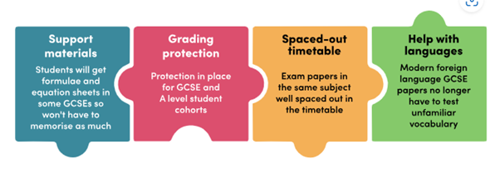
Ofqual, The Office of Qualifications and Examinations Regulation, has published official letters to governors and trustees, outlining what the grading system will look like for 2023 and the context behind their decisions. Below is that official letter; you can also view it on the government website.
Nina Sharma, senior policy and research officer said:"NGA recognises the hard work and dedication of teachers, school leaders and those governing to ensure that students are supported as the adjustments continue from the disruptions over the last few years. The protection that has been put in place for candidates offers assurance and facilitates a balance between facilitates the continuing return to normality while ensuring students are not impacted unfairly by the events of recent years. This letter from Ofqual’s Chief Regulator to governors and trustees offers clarity on what governing boards can expect from the 2023 cohort and enables boards to identify what grades may look like for their own school or trust against a national picture."
Qualification results in 2023
Dear Governor or Trustee,
Firstly, I would like to introduce myself. I am Dr Jo Saxton, Chief Regulator at Ofqual, the regulator of qualifications, exams and assessments in England.
Having been a school leader and governor, I appreciate how many responsibilities you have, including understanding qualification results and what lies behind them. I’m writing to explain 2023 grading arrangements and the national context for results.
When students began their GCSE and A level courses in 2021, Ofqual set out a two-year plan to return to pre-pandemic grading after the exceptional arrangements during covid. See below for more information about this year’s arrangements. In September 2022, we confirmed that this year there will be a return to pre-pandemic grading with protection built into the GCSE and A level grading process.
This protection means that a student who would have achieved a B in A level geography before the pandemic, for example, is just as likely to do so this year, even if their performance in the assessments is a little weaker than it would have been before the pandemic.
Student work will be marked and graded in the normal way. And whilst we won’t know precisely what results will look like until all work is marked and graded, the return to pre-pandemic grading means this year’s national results will be lower than in 2022. It follows therefore that it is highly likely that your school or college’s headline results will be lower than last year and as such, it will be more meaningful to compare this year’s results with 2019 which was the last year that exams took place before the pandemic.
The grading standard used pre-pandemic is familiar and recognisable to students, teachers, higher education and employers as a measure of what students know, understand and can do. Moving back to this pre-pandemic position makes sure we are preparing students for their next steps and helping them make the right choices.
For students taking vocational and technical qualifications (such as BTECs or Cambridge Nationals), awarding organisations will use suitable grading approaches for their qualifications, which are assessed in a range of ways. Senior examiners will recommend grade boundaries based on a combination of expert judgement – including reviewing the quality of student work – and data. Awarding organisations will take into account the GCSE and A level grading approach where appropriate, so students are not advantaged or disadvantaged, irrespective of the qualifications they take.
For Technical Qualifications within T Levels, Ofqual has asked awarding organisations to award generously in the first years of awards, as they are new qualifications and teachers and students are less familiar with the assessments. 2023 is the first year that Technical Qualifications are based fully on exams (previously some included teacher assessed grades). This means the profile of results may look different in some subjects. It will be important not to compare them with last year’s results, as this would not be meaningful due to the different assessment arrangements.
I hope that this information helps you to understand the national context when you consider exam results in the autumn term for the schools and colleges you work with, as you continue your important roles as governors and trustees.
Jo Saxton PhD
Chief Regulator
Further information
Arrangements for 2023
Students taking their GCSEs and A level and assessments received some additional support to recognise the disruption they have experienced.

Ofqual wrote to admissions officers in December last year to remind them of the grading arrangements, so they were aware of the return to pre-pandemic grading when making admissions decisions. As in any year, the overall number of university places available is not affected by the approach to grading qualifications.
Resources for students, parents, schools and colleges
Ofqual provides a range of information about regulated qualifications, including a guide for schools and colleges and student guide. The student guide includes sources of support and information for students when they receive their results in August. We have sent this to all schools and colleges and would appreciate your support in continuing to raise awareness of these resources.
You may be aware that earlier this year I wrote a letters to parents and to school and college leaders, which included a message for students. It is so important to me that all those taking and using regulated qualifications understand the arrangements in place.
For more information visit Ofqual’s website.